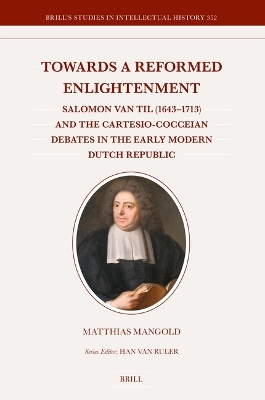
Towards a Reformed Enlightenment
Brill (Verlag)
978-90-04-69724-9 (ISBN)
In Towards a Reformed Enlightenment: Salomon van Til (1643–1713) and the Cartesio-Cocceian Debates in the Early Modern Dutch Republic, Matthias Mangold offers the first in-depth investigation into the theological and philosophical convictions of an influential, yet hitherto much neglected, Dutch theologian working around the turn of the eighteenth century.
With its strong contextual approach, this analysis of Van Til’s thought sheds new light on various intellectual dynamics at the time, most notably the long-standing conflict between the Voetian and Cocceian factions within the Dutch Reformed Church and the reception of Cartesian philosophy in the face of emerging Radical Enlightenment ideas.
Matthias Mangold, Ph.D. (2021), Evangelische Theologische Faculteit, Leuven, is Affiliated Researcher in Historical Theology at that school. He has contributed to a new bilingual edition of the Synopsis Purioris Theologiae (1625) and published studies on early modern theology, Reformed scholasticism and the impact of the New Philosophy.
Preface
Abbreviations
Introduction
1 Literature Review
2 Objectives of This Study
3 Methodological Considerations
4 Sources
5 Overview
Part 1: Van Til in Context
1 Intellectual Developments at Van Til’s Time
1.1 Introduction
1.2 Currents within Early Modern Dutch Protestantism
1.3 Descartes and Cartesianism in the Dutch Republic
1.4 Spinoza, Spinozism and the ‘Radical Enlightenment’
1.5 Summary and Conclusion
2 Van Til’s Life and Work
2.1 Van Til’s Early Life and Education
2.2 Pastoral Ministry in North-Holland (1666–1683)
2.3 Minister and Professor in Dordrecht (1683–1702)
2.4 Professor in Leiden (1702–1713)
2.5 Summary and Conclusion
Part 2: Van Til’s Cartesianism
3 Theology and Philosophy
3.1 Introduction
3.2 Early Modern Discussions on Theology and Philosophy
3.3 Van Til’s Concept of Rational Philosophy
3.4 Philosophical Knowledge
3.5 Theology and Philosophy Separated
3.6 Harmony and Tension
3.7 The Nature of Revealed Theology
3.8 Establishing the Authority of Scripture
3.9 Summary and Conclusion
4 Natural Theology
4.1 Introduction
4.2 Van Til’s Compendium on Natural Theology
4.3 Natural Theology: Knowing God
4.4 Natural Ethics: Serving God
4.5 Preparation for the Gospel
4.6 Summary and Conclusion
5 Reason and Scriptural Interpretation
5.1 Introduction
5.2 Scripture, Clarity, and the Task of Interpretation
5.3 Tradition and Church Authority
5.4 The Proper Use of Reason
5.5 Interpretation “Befitting of God” and the Unity of Truth
5.6 The Bible, Divine Accommodation, and the Copernican Worldview
5.7 Dualism and the Devil
5.8 Summary and Conclusion
6 Engagement with Spinoza
6.1 Introduction
6.2 Historical Considerations
6.3 Anti-Spinozan Polemics in the Voor-hof and the Vervolg
6.4 The Voor-hof (1694) and the Challenge to Biblical Authority
6.5 The Vervolg (1696) and Spinoza’s Radical Theology
6.6 Van Til’s Academic Engagement with Spinoza in His Compendium
6.7 Summary and Conclusion
Part 3: Van Til’s Cocceianism
7 A Call for Moderation
7.1 Introduction
7.2 The “Leiden Prohibition” and the Voetian Polemics of 1676
7.3 Cocceian Irenicism in the Aftermath of 1676
7.4 Van Til’s Plea for Concord: Salems vrede (1678)
7.5 Van Til’s Fundamental Reflections on Ecclesiastical Peace
7.6 Van Til’s Assessment of the Cocceian Issues
7.7 Summary and Conclusion
8 Prophetic Theology
8.1 Introduction
8.2 Cocceius and the Roots of Cocceian Prophetic Theology
8.3 Further Developments and the Friesland Crisis of the Early 1680s
8.4 Van Til’s Inleydinge tot de prophetische schriften
8.5 Van Til’s Prophetic Exegesis and Emblematics
8.6 The De Joncourt Controversy
8.7 Summary and Conclusions
9 Federal Theology
9.1 Introduction
9.2 Van Til’s Concept of Covenant
9.3 The Covenant of Works (foedus operum)
9.4 The Covenant of Grace (foedus gratiae)
9.5 Salvation-Historical Differentiations in the Covenant of Grace
9.6 The “Counsel of Peace” between the Father and the Son
9.7 Summary and Conclusion
Conclusion
1 Van Til’s Appropriation of Cartesian Philosophy
2 Van Til’s Appropriation of the Cocceian Heritage
3 Van Til’s Cartesio-Cocceian Synthesis and the Reformed Enlightenment in the Dutch Republic
Appendix: Van Til’s Works in Chronological Order
Bibliography
Index
| Erscheinungsdatum | 29.05.2024 |
|---|---|
| Reihe/Serie | Brill's Studies in Intellectual History ; 352 |
| Verlagsort | Leiden |
| Sprache | englisch |
| Maße | 155 x 235 mm |
| Gewicht | 1035 g |
| Themenwelt | Geisteswissenschaften ► Philosophie ► Philosophie der Neuzeit |
| Sozialwissenschaften | |
| ISBN-10 | 90-04-69724-1 / 9004697241 |
| ISBN-13 | 978-90-04-69724-9 / 9789004697249 |
| Zustand | Neuware |
| Haben Sie eine Frage zum Produkt? |
aus dem Bereich


